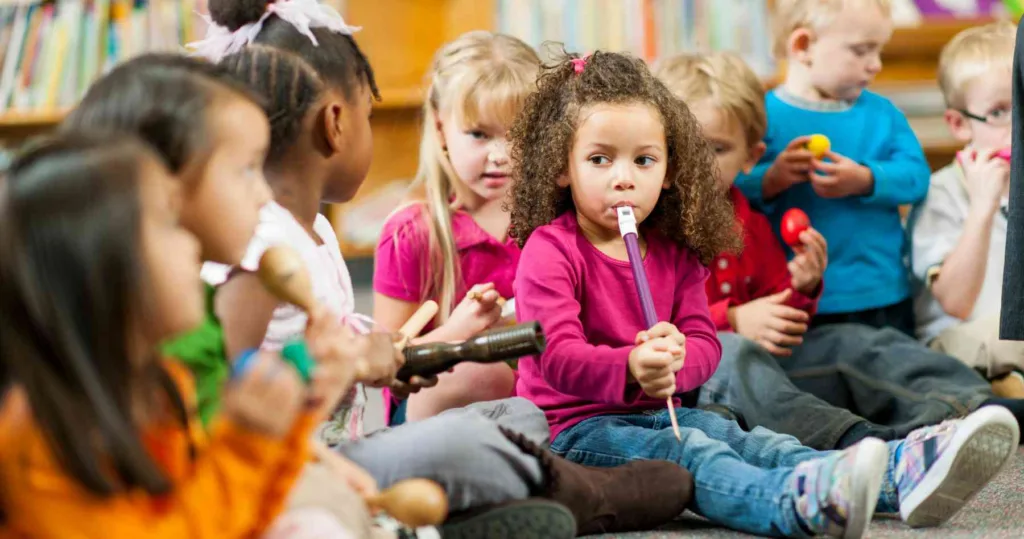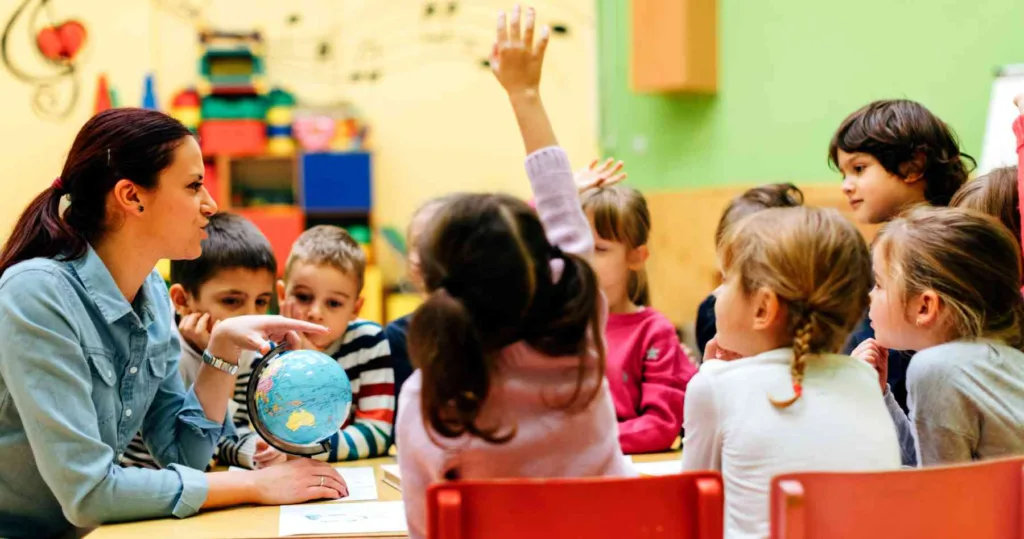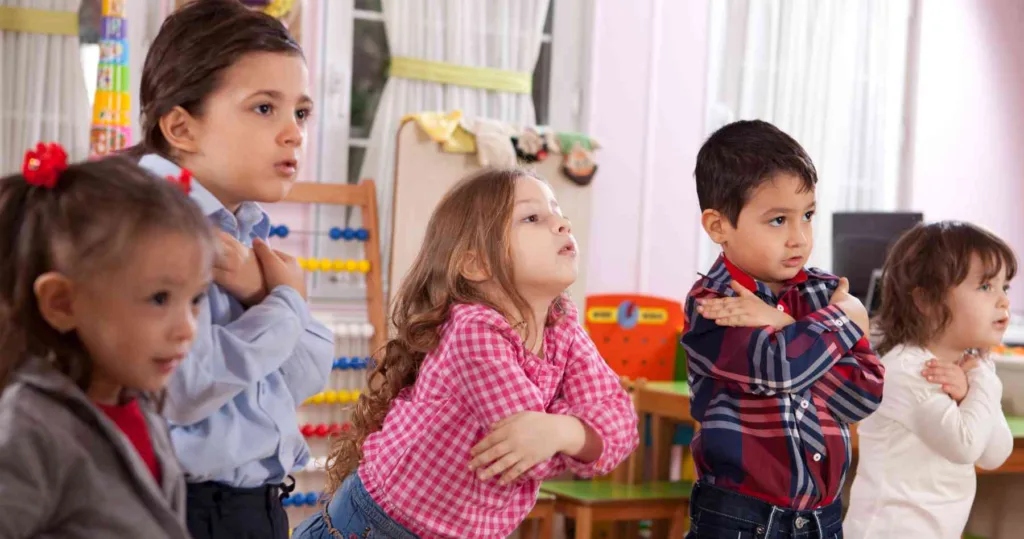Empowering Young Minds: The Transformative Emotional Benefits of Preschool Education
In today’s fast-paced world, it’s more important than ever to prioritize our emotional benefits. This is especially true for young children, whose emotional development lays the foundation for their future success and happiness. Preschool education plays a critical role in supporting this development, helping children build the confidence, resilience, and emotional intelligence they need to thrive.


Social Emotional Learning
The emotional benefits of preschool education are many. Research has shown that children who attend high-quality preschool programs are more likely to have better emotional and social outcomes than those who do not. These outcomes include improved self-esteem, greater social competence, and better problem-solving skills, among others.
In this article, we will explore in-depth the emotional benefits of preschool education, focusing on how it helps children develop confidence and resilience. We will discuss the different ways that preschool education supports emotional growth, including building self-esteem, teaching coping skills, and fostering a sense of belonging. We will also explore strategies for promoting emotional intelligence in young children, such as mindfulness practices and social-emotional learning programs.
By the end of this article, you will have a deeper understanding of the transformative power of preschool education for young children’s emotional development. Whether you’re a parent, teacher, or caregiver, you’ll come away with valuable insights and strategies for supporting children’s emotional growth and helping them reach their full potential.
Social-emotional skills refer to a set of abilities and behaviors that allow individuals to effectively navigate social interactions and regulate their own emotions. In preschool, social-emotional skills are critical for children’s emotional development and can lay the foundation for success in school and beyond.
Examples of social-emotional skills that preschool children may develop include:
Self-awareness: Children may learn to recognize their own emotions and understand how they impact their behavior and interactions with others.
Self-regulation: Children may learn techniques to manage their emotions and behaviors, such as taking deep breaths or counting to ten before reacting.
Social awareness: Children may develop empathy and an understanding of others’ emotions and perspectives.
Relationship skills: Children may learn how to form positive relationships with peers and adults, such as sharing and taking turns.
Responsible decision-making: Children may learn to make thoughtful choices and consider the consequences of their actions.
Social-emotional skills preschool examples:
Circle time activities where children share their feelings and experiences with each other.
Storytime activities where children discuss the emotions and motivations of characters in stories.
Group activities that promote cooperation and teamwork, such as building with blocks or playing group games.
Role-playing activities that allow children to practice social situations and problem-solving.
Mindfulness activities, such as breathing exercises and guided relaxation, that help children regulate their emotions and promote self-awareness.
Get In touch
Leave us a message
4 Claret Road, Table View, 7441
(021) 556 4146
office@applebeekids.com
Social and Emotional Development
Building Self-Esteem in Preschool
Self-esteem is a critical component of emotional well-being, especially in young children. Preschool education can play a vital role in building children’s self-esteem and helping them develop a positive self-image.
One of the ways that preschool education builds self-esteem is by providing children with opportunities to engage in activities that they enjoy and excel in. When children feel competent and successful at something, they are more likely to feel good about themselves and their abilities. Preschool programs can offer a wide range of activities, from art and music to sports and games, that allow children to discover and develop their interests and talents.
Another way that preschool education supports self-esteem is by providing children with positive feedback and encouragement. When teachers and caregivers praise children for their efforts and achievements, it reinforces their sense of competence and self-worth. Preschool programs can create a supportive and nurturing environment where children feel valued and appreciated for who they are.
Preschool education can also help children develop a sense of autonomy and independence, which can further enhance their self-esteem. When children are given opportunities to make choices and decisions for themselves, they learn to trust their own judgment and develop a sense of personal responsibility. Preschool programs can offer age-appropriate activities that allow children to practice decision-making and problem-solving skills.
Finally, preschool education can promote self-esteem by fostering positive relationships with peers and adults. When children feel connected and supported by others, it can help them feel more confident and secure in themselves. Preschool programs can encourage children to interact with each other and build relationships through activities like group projects, games, and social events.
In summary, building self-esteem is a critical component of emotional development, and preschool education plays a vital role in supporting this development. By providing children with opportunities to engage in activities they enjoy, offering positive feedback and encouragement, promoting autonomy and independence, and fostering positive relationships with peers and adults, preschool programs can help children develop the confidence and self-worth they need to succeed in life.
Coping Skills for Life
Life is full of challenges, and children need to learn coping skills to navigate them successfully. Preschool education can play a significant role in teaching young children the coping mechanisms they need to face adversity and overcome obstacles.
One way that preschool education teaches coping skills is by providing children with opportunities to experience and manage difficult emotions. Children may face a range of emotions in preschool, from frustration and disappointment to anger and sadness. By providing a safe and supportive environment to explore and express these emotions, preschool programs can help children learn to identify, manage, and regulate their emotions effectively.
Preschool education can also teach children specific coping strategies, such as deep breathing, visualization, and positive self-talk. These strategies can help children calm down when they are upset or overwhelmed, giving them the tools they need to manage their emotions in healthy ways.
Another way that preschool education supports the development of coping skills is by promoting problem-solving skills. Children who learn to approach problems with a positive attitude and a growth mindset are better equipped to handle challenges and setbacks. Preschool programs can teach problem-solving skills through activities such as puzzles, games, and group projects, where children learn to work collaboratively to find solutions.
Finally, preschool education can teach children resilience, which is the ability to bounce back from setbacks and challenges. Resilience is an essential component of emotional well-being, and it is something that can be learned and developed. Preschool programs can help children develop resilience by providing them with opportunities to take risks, make mistakes, and learn from their failures. By helping children develop a growth mindset and a positive attitude toward challenges, preschool education can set them up for success in the face of adversity.
In conclusion, coping skills are critical for children’s emotional development, and preschool education plays a significant role in teaching children these skills. By providing a safe and supportive environment for children to explore and manage their emotions, teaching specific coping strategies, promoting problem-solving skills, and teaching resilience, preschool programs can help children develop the skills they need to thrive in life.
Preschool education offers many emotional benefits that can support children’s development and lay the foundation for success in school and beyond. Here are five emotional benefits of preschool education:
Building self-esteem: Preschool provides a safe and nurturing environment where children can develop a sense of confidence and self-worth. Through positive reinforcement and encouragement from teachers and peers, children can develop a positive self-image and a belief in their abilities.
Developing resilience: Preschool provides opportunities for children to practice problem-solving and conflict resolution skills. Through these experiences, children can learn to bounce back from setbacks and develop resilience, which is critical for success in school and beyond.
Fostering a sense of belonging: Preschool provides opportunities for children to form positive relationships with peers and teachers. When children feel accepted and valued, they are more likely to develop a sense of belonging and connectedness, which can support their emotional well-being.
Developing empathy and social awareness: Preschool provides opportunities for children to interact with peers from diverse backgrounds and develop empathy and understanding for others. Through these experiences, children can develop social awareness and the ability to navigate social situations with empathy and respect.
Promoting emotional regulation: Preschool provides opportunities for children to learn and practice emotional regulation skills. Through techniques such as deep breathing and mindfulness, children can learn to manage their emotions and respond to challenging situations in a calm and constructive way.
In conclusion, preschool education provides many emotional benefits that can support children’s development and help them thrive emotionally and academically. From building self-esteem and resilience to fostering a sense of belonging and promoting emotional regulation, preschool education can lay the foundation for a lifetime of success.

Mindfulness and Emotional Intelligence
Mindfulness and emotional intelligence are two essential skills for emotional well-being, and preschool education can play a critical role in teaching children these skills.
Mindfulness is the practice of being present and fully engaged in the current moment. It is a skill that can help children manage stress, regulate emotions, and improve their overall well-being. Preschool programs can teach mindfulness through activities such as yoga, meditation, and breathing exercises. These activities can help children learn to focus their attention, regulate their emotions, and develop a sense of calm and inner peace.
Emotional intelligence is the ability to understand and manage one’s own emotions and the emotions of others. It is a skill that can help children build positive relationships and navigate social situations successfully. Preschool programs can teach emotional intelligence through social-emotional learning (SEL) programs. These programs teach children skills such as empathy, self-awareness, and conflict resolution. They also provide opportunities for children to practice these skills in real-life situations, such as during group projects or social events.
Together, mindfulness and emotional intelligence can help children develop a greater sense of self-awareness, self-regulation, and empathy. These skills can support children’s emotional well-being and set them up for success in their personal and social lives.
Mindfulness and emotional intelligence are two critical skills for emotional well-being, and preschool education can play a vital role in teaching children these skills. By incorporating mindfulness practices and social-emotional learning programs into preschool programs, children can develop greater self-awareness, self-regulation, and empathy, which can support their emotional development and help them thrive in life.
A Sense of Belonging
A sense of belonging is a fundamental human need, and it is especially important for children’s emotional development. Preschool education can help children develop a sense of belonging by creating a safe, nurturing, and inclusive environment where they feel valued and accepted.
One way that preschool programs can promote a sense of belonging is by creating a welcoming and inclusive environment. This includes having diverse books, toys, and materials that reflect the cultural backgrounds of all the children in the program. It also involves using inclusive language and teaching children to respect and celebrate differences.
Another way that preschool programs can promote a sense of belonging is by encouraging positive relationships between children, teachers, and families. This can be achieved through activities such as parent-teacher conferences, family events, and community outreach programs. By involving families and creating a sense of community, preschool programs can help children feel connected and supported.
Preschool programs can also promote a sense of belonging by providing children with opportunities to contribute and participate. This can be achieved through classroom jobs, group projects, and shared decision-making processes. When children feel like they have a voice and can contribute to the community, they are more likely to feel a sense of ownership and belonging.
Finally, preschool programs can promote a sense of belonging by providing children with opportunities to engage in meaningful and purposeful activities. This can be achieved through play-based learning, where children have the freedom to explore and learn at their own pace. When children are engaged in activities that are meaningful to them, they are more likely to feel a sense of purpose and belonging.
A sense of belonging is a fundamental human need, and preschool education can play a critical role in helping children develop this sense of connection and community. By creating a welcoming and inclusive environment, encouraging positive relationships, providing opportunities to contribute and participate, and promoting meaningful and purposeful activities, preschool programs can help children feel valued, accepted, and supported, which can have a positive impact on their emotional development.
ExcellentBased on 28 reviews Trustindex verifies that the original source of the review is Google.
Trustindex verifies that the original source of the review is Google. Pieter Kotze2022-03-11Great pre-primary school in Table View, it has been there for many years and we are now on the verge of sending the 2nd generation there and although they have been around for years, the staff are current and up to date with the latest in childcare and early childhood education, peace of mind for sure...Trustindex verifies that the original source of the review is Google.
Pieter Kotze2022-03-11Great pre-primary school in Table View, it has been there for many years and we are now on the verge of sending the 2nd generation there and although they have been around for years, the staff are current and up to date with the latest in childcare and early childhood education, peace of mind for sure...Trustindex verifies that the original source of the review is Google. Gareth Bolt2021-08-20Jackie,Maude and Applebee team look after our little boy so wonderfully!Trustindex verifies that the original source of the review is Google.
Gareth Bolt2021-08-20Jackie,Maude and Applebee team look after our little boy so wonderfully!Trustindex verifies that the original source of the review is Google. Shakurah Hackley2021-08-20My son loves his teachers. They care for our kids and go the extra mile.Trustindex verifies that the original source of the review is Google.
Shakurah Hackley2021-08-20My son loves his teachers. They care for our kids and go the extra mile.Trustindex verifies that the original source of the review is Google. Nolu Mandindi2021-08-19My daughter been a student since 2019, her brother joined her in 2021, we couldn't be happier with the professionalism shown by the staff. The constant feedback from teachers on progress is on point.
Nolu Mandindi2021-08-19My daughter been a student since 2019, her brother joined her in 2021, we couldn't be happier with the professionalism shown by the staff. The constant feedback from teachers on progress is on point.
The Emotional Benefits of Applebee Kids Preschool
As a parent, you want the best for your child, and choosing the right preschool can play a critical role in your child’s emotional development. At Applebee Kids Preschool, we understand the importance of emotional development and have created a program that fosters confidence, resilience, and a sense of belonging.
At Applebee Kids Preschool, we believe in the power of play-based learning, where children have the freedom to explore and learn at their own pace. Through play, children can develop critical skills such as problem-solving, creativity, and collaboration, which can support their emotional development.
We also incorporate mindfulness practices and social-emotional learning programs into our curriculum, which can help children develop greater self-awareness, self-regulation, and empathy. Our teachers are trained to create a safe, nurturing, and inclusive environment where children feel valued and accepted.
We believe in the importance of positive relationships between children, teachers, and families, and we encourage parent involvement through activities such as parent-teacher conferences, family events, and community outreach programs. By involving families and creating a sense of community, we help children feel connected and supported.
At Applebee Kids Preschool, we provide children with opportunities to engage in meaningful and purposeful activities, such as gardening, cooking, and community service projects. When children are engaged in activities that are meaningful to them, they are more likely to feel a sense of purpose and belonging.
We understand that choosing a preschool is a big decision, and we want you to feel confident in your choice. At Applebee Kids Preschool, we are committed to supporting your child’s emotional development and helping them thrive in life. We invite you to visit our website to learn more about our program and schedule a tour to see our facility firsthand.
In conclusion, choosing the right preschool can have a significant impact on your child’s emotional development, and Applebee Kids Preschool is committed to fostering confidence, resilience, and a sense of belonging in all of our students. With our play-based learning approach, mindfulness practices, social-emotional learning programs, and a focus on positive relationships and meaningful activities, we provide children with the foundation they need to thrive emotionally and academically. We invite you to join our community and see the difference that Applebee Kids Preschool can make in your child’s life.
